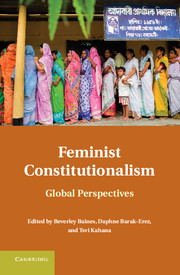Book contents
- Frontmatter
- Contents
- Foreword
- Contributors
- Introduction
- Part I Feminism as a Challenge to Constitutional Theory
- 1 The Gendered Division of Household Labor
- 2 Feminist Fundamentalism and the Constitutionalization of Marriage
- 3 Abortion, Dignity, and a Capabilities Approach
- Part II Feminism and Judging
- Part III Feminism, Democracy, and Political Participation
- Part IV The Constitutionalism of Reproductive Rights
- Part V Women's Rights, Multiculturalism, and Diversity
- Part VI Women between Secularism and Religion
- Index
- References
3 - Abortion, Dignity, and a Capabilities Approach
Published online by Cambridge University Press: 05 June 2012
- Frontmatter
- Contents
- Foreword
- Contributors
- Introduction
- Part I Feminism as a Challenge to Constitutional Theory
- 1 The Gendered Division of Household Labor
- 2 Feminist Fundamentalism and the Constitutionalization of Marriage
- 3 Abortion, Dignity, and a Capabilities Approach
- Part II Feminism and Judging
- Part III Feminism, Democracy, and Political Participation
- Part IV The Constitutionalism of Reproductive Rights
- Part V Women's Rights, Multiculturalism, and Diversity
- Part VI Women between Secularism and Religion
- Index
- References
Summary
In the United States, as Reva Siegel has recently noted, the right to abortion has increasingly been linked by pivotal justices to the idea of individual human dignity. This connection between ideas about human dignity and rights of access to abortion also finds support in a broader comparative context.
For example, in Canada, in her concurring judgment in R v. Morgentaler, Justice Wilson suggested that “respect for human dignity” was central to the issue of access to abortion because “the right to make fundamental personal decisions without interference from the state” was a key aspect of human dignity, as one of the central values on which the Canadian Charter of Rights and Freedoms 1982 was founded. In Germany, in the Abortion I Case, the German Federal Constitutional Court (GFCC) held that “pregnancy belongs to the sphere of intimacy of the woman, the protection of which is guaranteed by the Basic Law”; and further that this sphere of intimacy, and the right of self-determination it implied, were “values to be viewed in their relationship to human dignity.” In the Abortion II Case, the GFCC was even more explicit in recognizing that access to abortion was supported, or indeed probably even required, by “the human dignity of the pregnant woman, her…right to life and physical integrity, and her right of personality.” In Brazil, in 1999, in the case of a pregnancy involving an anencephalic fetus, the Supreme Court of Brazil placed similar reliance on the idea of human dignity – and the capacity of “gestating pain, anguish, and frustration” in the context of such a pregnancy to cause “violence to human dignity” – as the prime basis for invalidating a prohibition on access to abortion in such circumstances. More recently, in Colombia in 2006, in holding that the Colombian Constitution protects certain minimal rights of access to abortion, the Colombian Constitutional Court cited a concern for human dignity as a basis for striking down the criminalization of abortion in three sets of circumstances: where a pregnancy is the result of rape; involves a nonviable fetus; or threatens a woman's life or health. In other countries, such as Australia, the idea of human dignity has also been relied on to support recognition of related reproductive rights claims, such as the freedom from involuntary sterilization.
- Type
- Chapter
- Information
- Feminist ConstitutionalismGlobal Perspectives, pp. 64 - 82Publisher: Cambridge University PressPrint publication year: 2012
References
- 12
- Cited by



